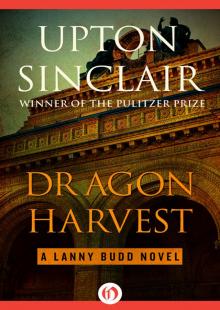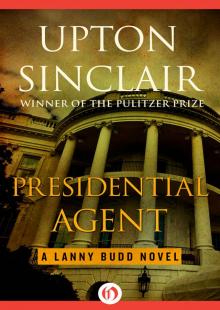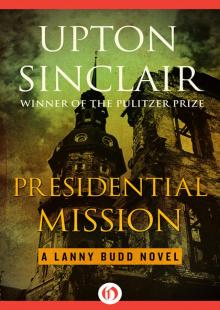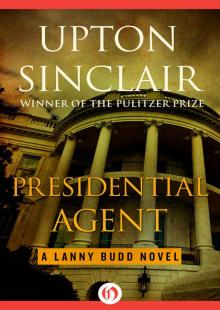- Home
- Upton Sinclair
Dragon Harvest Page 11
Dragon Harvest Read online
Page 11
XI
She was beautiful to look at, and graceful in every movement. She fled with quick eager steps, and her partner pursued her timidly, as if afraid to catch her; perhaps she would disappear entirely if pursued too boldly. She cast mocking glances back at him; she made herself the incarnation of that happy irresponsibility which has never existed in nature, but which poets have made out of some of nature’s appearances. It was Marceline herself, saying: “I have what I want. I am sufficient to myself. No man is ever going to hold me!” She felt safe enough from the advances of her partner to cast laughing glances at some of the diners who happened to catch her fancy; she would pass near them and give them a flirt of the filmy veils, and then be off like a hummingbird to the next group of blossoms.
Knowing who was coming with Lanny, she had prepared a little drama. She stopped when she came to his table, and the music stopped also. The dancing youth fell back, as if in awe of such important personages; Marceline bowed to each, and then held out her hand to Lanny. She didn’t need to speak, for she had done the same thing many times, in different companies; wherever they happened to be, they entertained their friends with dancing. They knew each other’s every whim, and a whispered word was enough prelude to a whole dance. Lanny arose and took her hand; the music started the Vienna Woods waltz, and they swept away in what in Lanny’s youth had been known as “society dancing.” Said the M.C.: “Mademoiselle Marceline is dancing with her brother, Mister Lanny Budd, of Newcastle, Connecticut.” So much more romantic to hail from three thousand miles away and a strange Indian name, than from the Riviera, where everybody went in for sun-bathing! The audience applauded, and the couple treated them to a whirl which made the white veils fly out like the cream in a separator.
They returned to the table amid a storm of applause. Marceline, breathing hard, bowed in all directions. Lanny looked at his friends, and observed that the younger of the two Germans was gazing at the lovely dancer with a look of open-mouthed and open-eyed admiration. Marceline wouldn’t fail to notice it, and to like what she saw. He was a handsome youth, well set up, a soldier and an aristocrat in a showy and elegant uniform; his cheeks were pink with health, and the dueling scar, being symbolic, was not supposed to be a disfiguration. Oskar had bright blue eyes, and just now they were seeing nothing but the daughter of Beauty Budd and her French painter.
She smiled, and held out her hand, and that was enough. The young Prussian leaped to his feet, bowed from the waist, and came quickly and took Lanny’s place. Away they went—no “fancy dancing,” for Marceline wouldn’t know if he was capable of that, and to try and fail would be humiliating. They would dance as all gentlemen learned to dance in that day, gravely and with complete dullness. “Mademoiselle Marceline is dancing with the Herr Leutnant Oskar von Herzenberg, son of Seine Hochgeboren, Graf von Herzenberg of the German embassy in Paris.” The announcement pleased everyone, for appeasement was the mood and watchword of the hour. Up with the Nazi-Fascists and down with the Reds!
Lanny watched the young couple, so well matched and so obviously pleased with each other. His mind was full of thoughts which he would not utter. Marceline had been deeply hurt in her love life, and in her fury she had declared: “The next man that wants me will pay!” Would this handsome Junker pay? Would he have anything to pay with? Would his father, who was keeping an actress and making her earn her keep, favor the idea of his son’s following in the same course? Lanny could see that the youth was dangerously charming; and would Marceline have to learn about Brownshirts in the same painful way that she had learned about Blackshirts? Political ideas, he knew, meant nothing to her. She had been brought up to be beautiful, to be admired, and to enjoy herself, all as a matter of course.
One turn about the dancing floor was enough. Marceline returned her partner to his seat, and once more the orchestra took up her flight from reality. Her partner chased her from the scene amid polite applause; and the young Prussian, with cheeks flushed and blue eyes shining, exclaimed: “Herr Budd, Ihre Schwester ist ein Frühlinglied!” A song of spring—and Lanny knew that it would soon be spring in Paris, and that Leutnant Oskar would not fail to come again to the Chanteclair, and that if he sent in his card to the danseuse it would not go where so many others had gone, into the trashbasket.
XII
A week-end at the Château de Bruyne was compulsory for Robbie Budd whenever he came to Paris; otherwise the feelings of that family would have been deeply wounded. Denis père had not been invited to the dinner which Baron Schneider had given for Robbie and the French magnates, and all the family knew the reason; Denis and his two sons had been in jail, and while that was an honor, it was also sensational and conspicuous, and the very rich don’t like things of that sort; they prefer to hide what they do, and shudder at the thought of seeing their names in newspapers. Not all the two hundred families were in sympathy with the Cagoulards—and especially not when these “Hooded Men” got caught and had their homes raided by the police, and pictures published of the concrete fortifications they had built on their country estates! Schneider had been the one who got Denis into the Cagoule, but now he was beginning to think that maybe he had gone too far, or at any rate too fast, and so he would leave Denis out of a dinner conference to which he would invite de Wendel and Mercier and others who were still playing along with politicians of the Cabinet.
The pillbox had been broken up and carted away, that having been one of the conditions on which the three men had been released. So now the garden told only of peace, as it had some seventeen or eighteen years back, when Marie de Bruyne had first brought Lanny there. The branches of the trees and shrubs were bare and the ground was black and wet, but already it was growing warm against the wall which faced the south, and a few little green things were timidly peeking from the well-worked and well-manured soil. Soon it would be spring, and the apricot trees spread out against the wall like vines would put on a curtain of pink blossoms before they showed a green leaf, and iris and heart’s ease and tulips would make a sort of fringe or wainscoating beneath. The gray-haired old gardener would say to Lanny: “Comme madame les aimait, m’sieu’!”
Of the five women whom Lanny had loved in the course of his checkered life, Marie de Bruyne had been the one to give him the most happiness. She had been more than ten years dead, but everything on the place was still hers, the flowers, the piano, the books. There were secrets he shared with nobody but her memory. Soon after her death he had received what purported to be spirit communications from her, but these had ceased, and he had only the question he could never answer to his own satisfaction, whether that gentle ministering spirit still existed somewhere, somehow, in this strange incomprehensible universe, and whether there was any chance that he might see her or hear her voice again. Two women who had loved him were now in that spirit world; Marie and Trudi, one French and one German, different in as many ways as the languages they spoke; yet both were women, and both had loved him, and would not quarrel with each other in that realm where there was no marriage or giving in marriage.
Marie, an unhappily married woman, had charged Lanny on her deathbed to do what he could for the welfare of her two sons. Lanny didn’t know quite what to call himself, foster-father, stepfather, godfather; but here he was, a sort of left-handed member of the family in a fashion peculiar to France. He came to visit them whenever he could, and had helped to see them properly married and their families installed in the home—again the fashion of the French, whose aristocratic and Catholic families retain the patriarchal attitude. Denis the elder was over eighty and was feeling his age—this had begun, so he said, in prison, though they had treated turn with courtesy and permitted him to purchase comforts. Trying to overthrow your government is an ancient and respectable practice in Europe, and only among the Nazis was it harshly dealt with.
XIII
Three Frenchmen and two Americans sat in front of a log fire in a drawing-room full of old furniture, books and objets d’art, and talked out their
hearts on the subject of their two countries. Both were in the hands of evil and incompetent men—so the five agreed. The peril of France was the greater, because she lacked the advantage of three thousand miles of protecting ocean. France ought to make peace with her hereditary German foe; but the corrupt and incompetent politicians wouldn’t let her, and before long it would be too late, and then would come “l’irréparable”—the phrase by which men of their way of thinking referred to war between Germany and France.
Robbie Budd couldn’t say much to console these friends. He had been asking questions of army officers and businessmen, and the technical men he had brought over had been doing the same. All agreed that French aviation, as compared with German, was in a backward state. It was not merely that labor was in revolt and that sabotage was common; it was that so many of the manufacturers were incompetent. The factories were small, and fathers passed on the control to sons who were timid and old-fashioned in their ideas, afraid to spend money upon new developments.
One of the greatest dangers was the concentration of airplane manufacture in and about Paris. This would be fatal in wartime, and “decentralization” was endlessly talked about, but nothing was done. In the southwest of France were great numbers of quarries which offered excellent places for the concealment of aircraft manufacture; surveys had been made and plans drawn, but no steps had been taken to run power lines and railroads to these places. Also, and worst of all, was the neglect to promote the manufacture of motors; anybody could make planes in a hurry, but motors required foundries and machine tools, and France was a second-class nation where these were concerned.
To Robbie Budd all these evils were the result of so-called “democracy” run wild: labor unionism meddling in politics and electing demagogues who presumed to tell businessmen how to run their affairs. Worst of all was this Red business of “nationalizing” airplane plants, something which to Robbie was on the same moral plane as highway robbery. In France the program had produced chaos, for no manufacturer knew when his turn would come, and his business life depended upon his knowing which politicians to buy. The plants which had been taken over might as well have gone out of business; materials didn’t arrive on time, investigating commissions kept the administrators from their work, standards were a matter of whim and jobs a matter of political pull. All this Robbie knew on the authority of his own experts, men who had looked into conditions in one “nationalized” plant with a view to having it make changes in Budd-Erling planes.
Lanny listened to this tale of woe with secret amusement, for he had talked with these same experts, and had been told their conclusion, that this government plant was in competition with one of the most powerful privately owned plants in France, and the private concern had hired the French Minister of Aviation in his capacity as a private lawyer. The assistant director of the public plant, the man responsible for most of the chaos, had informed Robbie’s men that he didn’t have to worry about any of the investigations, since he had such political influence that he couldn’t be removed. Robbie’s experts had told him that fact, but Robbie didn’t consider it important enough to be mentioned in his conversation. What the great private concern was doing in France was exactly what Robbie would have been doing if he had found himself faced with government competition at home. Fight the devil with fire!
XIV
Denis de Bruyne père was a stockholder in the Budd-Erling enterprise, so he had a double reason for wishing his country to be provided with these planes. The contract wasn’t going through as quickly as Robbie had hoped, and Denis had paid a call on General Gamelin, Chief of Staff of the French army, and the man who had most to say about what weapons it should have. Denis had been received in the École Militaire, where the Generalissimo used a study which had once served his great master, Joffre, whose equestrian statue now stood in the square in front of the building. Denis described the Louis XV room, decorated with gold crowns and fleurs-de-lis, and large paintings representing the battles of Fontenoy and Lawfeld—victories which the French army had won nearly two hundred years ago and which it dreamed of repeating.
The general himself was a neat little man with a round head, bright rosy cheeks, and light silky mustaches turned up at the ends like Kaiser Wilhelm’s. He had been friendly and courteous to the head of an old French family, and had discussed the problems of la patrie quite frankly. It was the same old trouble: there were twice too many Germans, and this had made it necessary for the French to dig great holes in the ground and to line and cover them with concrete. The French holes were called the Maginot Line and the German holes opposite to it were called the Siegfried Line, and each nation was destined to spend a long time in them, according to the French Chief of Staff; whichever side was reckless enough to come out first would surely be lost. This old gentleman had reached the retiring age, but had been kept on because he was the only general the Leftists did not actively hate. He declared earnestly that he believed in airplanes, they would be most useful in getting information and perhaps in an emergency in getting food and ammunition to the men in the concrete holes; but the notion of planes as an active weapon of offense was one in which he could not bring himself to take stock.
So apparently Robbie’s order wasn’t going to be as big as he had hoped. He was vexed, of course, and pointed out that unfortunately the French had failed to continue their holes along the Belgian border to the sea. They had counted upon their alliance with the King of the Belgians; but that monarch had taken up the idea of remaining neutral, if he could, and that had left the French republicans in a most uncomfortable position. They left Robbie in one, also, for he had to keep his assembly line full, and if he couldn’t persuade the French to protect themselves, he would be forced to make the best deal he could with Marshal Göring.
Denis the elder, greatly disturbed, said that he would go on Monday morning to interview Premier Daladier, a man whom he disliked because he was carelessly dressed, and not very clean, and always smelled of absinthe. Annette, the very intelligent young wife of Denis fils, volunteered to pay a call at 103 avenue Henri Martin, the home of pretty, blue-eyed Marie-Louise, Duchesse de Crussol d’Uzes, and try to persuade her of the seriousness of the situation. She was the one whose opinion counted most with the Premier; and that was the way you put through business deals in present-day France!
BOOK TWO
Who Sups with the Devil
5
The Pitcher to the Well
I
A spell of mild weather, and Lanny persuaded his father that they might as well motor to Berlin; they could leave after business hours and drive up the valley of the Oise by night, spend the night in Belgium, and reach their destination the following night. Lanny had plans of his own for which he would want the car later. So Robbie’s experts returned to Connecticut, taking with them a brief case full of documents, including some contracts—not so big as Robbie had hoped, but then it was always that way in dealing with politicians and brass hats. It was Robbie’s inescapable fate to be dealing with one or the other or both, and it would have been hard for him to say which pleased him less. For the president of Budd-Erling, life’s greatest mystery was the lack of harmony between production and marketing; the former was so easy and the latter so difficult. Efficiency was Robbie’s god, and sales resistance was his devil, and in all the religions of the world these two forces may be observed in conflict.
Speeding by night on a fine military road, with a driver who knew it well, the father discussed his problems past and future. He had given the French every chance in the world; and since they were so niggardly—clamoring for long-term credits and hanging on with a kind of frenzy to every ounce of that gold under the Paris streets—all right, their folly would rest on their own heads. Not for the first time Robbie Budd announced that whatever might befall the Third Republic was not going to worry him. The problem now was to get as much business as he could out of Germany—and that was a matter that required tactful handling, for Germany had very little gold
, and American banks were taking very few Hitler bonds these days. The German-Americans were still getting together and heiling one another and spitting Nazi gutturals into their beer, but when it came to investments, most of them preferred A.T. and T. So Dr. Schacht had complained to Robbie, and for once he wasn’t lying.
All the way from Paris to Berlin, Robbie talked about how he was going to deal with Der Dicke, no longer so dick. He had proved himself a man of bad faith, but then, how many would show themselves otherwise, in a situation such as Germany faced? The fat Marshal was figuring on war—why else would he be building an air force? In case of war, Britain might be blockading Germany, and America’s sympathies would be with Britain; whatever Göring gave to America he would be giving to Britain—so naturally he would want to get as much and give as little as possible.
All right, meet the old-style robber baron on his own ground, laugh with him, and take his rascality for granted. Don’t quarrel with him—for if he gets angry, you’ll get nothing out of him. Remember that he may win the next war, and then you’ll be doing business with him again. “The way I figure it,” said the cautious businessman, adopting his son’s theory for his own, “if America gets into the war, I don’t have to worry—there’ll be a market for every plane we can produce. The problems arise in the case of our staying out; I don’t want to make an enemy of the winner, and I certainly don’t want to have any paper of the losers. Better to worry along on what cash business I can get.”

 Prince Hagen
Prince Hagen Dragon Harvest
Dragon Harvest The Jungle
The Jungle Sylvia's Marriage
Sylvia's Marriage Oil! A Novel by Upton Sinclair
Oil! A Novel by Upton Sinclair The Coal War: A Novel
The Coal War: A Novel Presidential Agent
Presidential Agent World's End
World's End The Second-Story Man
The Second-Story Man O Shepherd, Speak!
O Shepherd, Speak! Wide Is the Gate
Wide Is the Gate The Return of Lanny Budd
The Return of Lanny Budd One Clear Call I
One Clear Call I 100%: the Story of a Patriot
100%: the Story of a Patriot The Machine
The Machine Presidential Mission
Presidential Mission A Cadet's Honor: Mark Mallory's Heroism
A Cadet's Honor: Mark Mallory's Heroism Between Two Worlds
Between Two Worlds World's End (The Lanny Budd Novels)
World's End (The Lanny Budd Novels) Between Two Worlds (The Lanny Budd Novels)
Between Two Worlds (The Lanny Budd Novels) The Coal War
The Coal War Presidential Agent (The Lanny Budd Novels)
Presidential Agent (The Lanny Budd Novels) Oil (filmed as There Will Be Blood)
Oil (filmed as There Will Be Blood) Wide Is the Gate (The Lanny Budd Novels)
Wide Is the Gate (The Lanny Budd Novels)